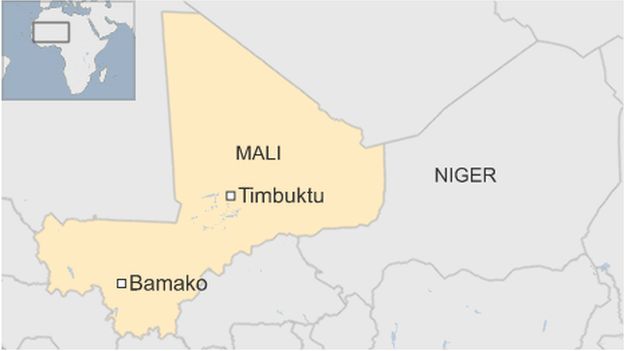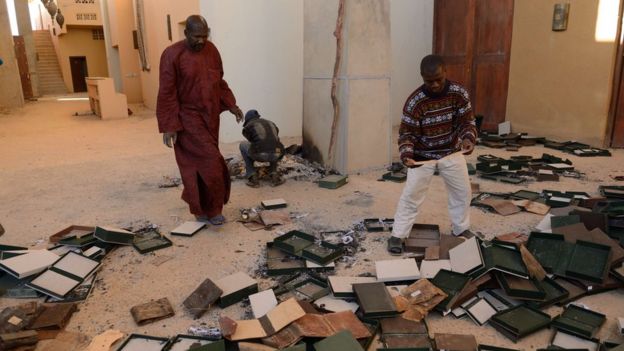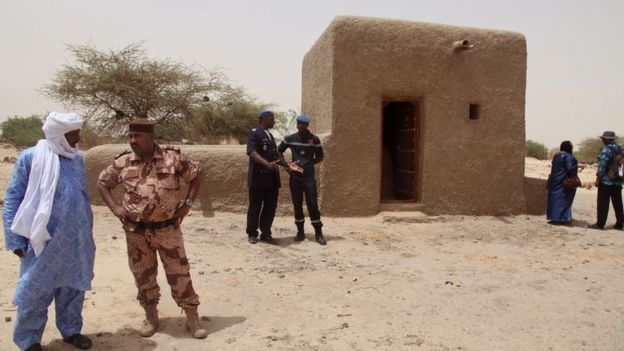
A suspected Islamist militant accused of destroying cultural sites in Timbuktu has appeared before the International Criminal Court (ICC), in the first case of its kind.
Ahmad al-Faqi al-Mahdi is suspected of war crimes over the destruction of nine mausoleums and a mosque in the ancient Malian city in 2012.
He was handed over by Niger after the ICC issued a warrant for his arrest.
Islamists occupied the city until they were ousted by French forces in 2013.
Wearing a navy-blue suit and wire-rimmed spectacles, Mr Faqi told the court: "My name is Ahmad al-Faqi al-Mahdi, I am from the al-Ansar Tuareg tribe."
He told the court he was born "about 40 years ago" in Agoune, 100km (60 miles) west of Timbuktu, and was a "graduate of the teachers' institute in Timbuktu and... a civil servant in education in the Malian government beginning 2011".
He said he wished to be spoken to in Arabic, but gave no other statement during the proceedings at which the charges were read out.
The judge said the next hearing would be on 18 January, where a decision would be taken whether to put the suspect on trial.
Treasures of Timbuktu
 AP
AP- Timbuktu was a centre of Islamic learning from the 13th to the 17th Centuries
- 700,000 manuscripts had survived in public libraries and private collections
- Books on religion, law, literature and science
- Added to Unesco world heritage list in 1988 for its three mosques and 16 cemeteries and mausoleums
- They played a major role in spreading Islam in West Africa; the oldest dates from 1329
- Islamists destroyed mausoleums after seizing the city in April 2012

According to the prosecutor, Mr Faqi was a "zealous member" of Ansar Dine, a Tuareg extremist militia with links to al-Qaeda, reports the BBC's Anna Holligan who was in court.
He is alleged to have been head of the Hesbah - or what some call the "manners' brigade" - which enforced strict Islamist law in Timbuktu during the unrest that rocked Mali in 2012 and 2013, and of being involved with and executing the decisions of the so-called Islamic Court of Timbuktu.
During their occupation, the militants vandalised and destroyed mosques and mausoleums, and burnt tens of thousands of ancient manuscripts.
The city - which is listed as a World Heritage Site by Unesco - was considered the centre of Islamic learning from the 13th to the 17th Centuries.
At one time it counted nearly 200 schools and universities that attracted thousands of students from across the Muslim world.
 AFP
AFP AP
AP
The mausoleums were shrines to Timbuktu's founding fathers, who had been venerated as saints by most of the city's inhabitants.
But this practice is considered blasphemous by fundamentalists.
Earlier this year, 14 mausoleums were rebuilt by local stone masons using traditional techniques.
The case against Mr Faqi is the first to be brought before the ICC "concerning the destruction of buildings dedicated to religion and historical monuments".
The court, which has until now always focused on attacks against people, hopes the charges against Mr Faqi will deter others who may seek to destroy these treasured pieces of history, our correspondent says.



No comments:
Post a Comment